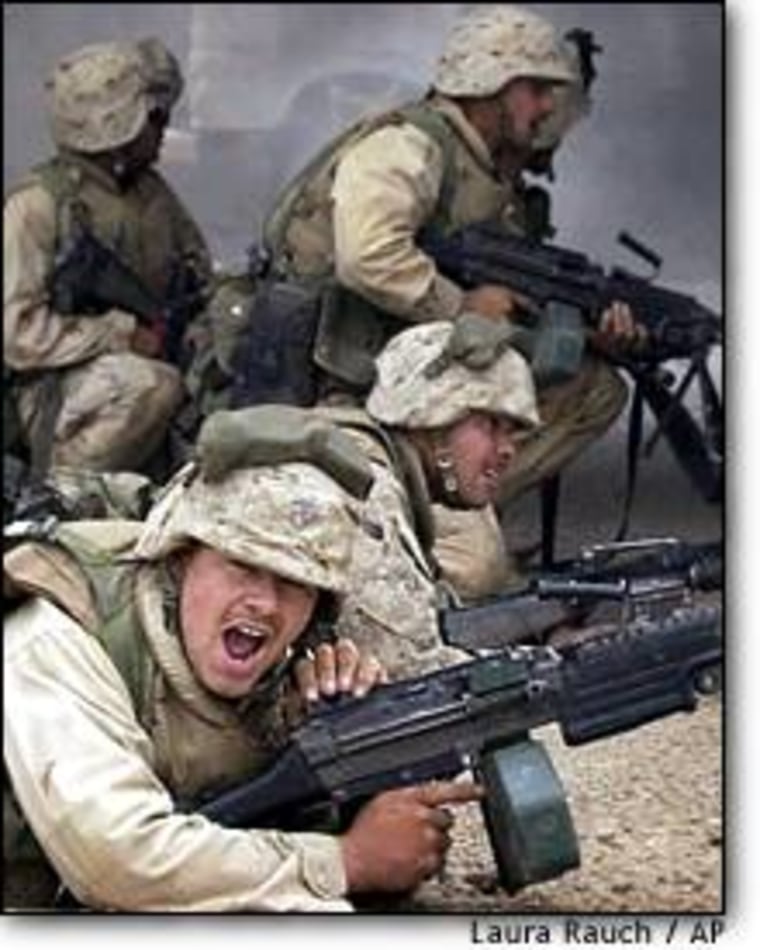Although cheering crowds may have greeted U.S. forces in parts of the city Wednesday, other areas were still under Iraqi control. The situation was tense, with militia members roaming the streets and, in at least one instance, firing on civilians.
The Iraqi information minister was nowhere to be seen this morning — we haven’t seen any other ministers in several days, actually — so we went out to see for ourselves what was going on.
We took our Iraqi government minder with us because he’s not a bad guy — he translates for us.
There were still militia driving around in vans and cars. We saw one battered old car with two young men in the back hanging out, one with a rocket-propelled grenade and another with a Kalashnikov automatic rifle. They looked pretty mean.
Then we came across a man who had been shot and badly wounded in the leg. He was just an ordinary chap who was returning in a taxi from visiting his sister when a pickup truck load of militia suddenly started firing and hit him in the leg.
IRAQI DOCTORS, NURSES ARE HEROES
We drove him to a hospital and they tended to him immediately. The real heroes of this war are the Iraqi doctors, nurses and medical staff. There is a shortage of supplies, and it has been a nightmare for them, but they have worked tirelessly for the last 21 days.
They’ve lived through three wars in recent years, so they know what they are doing — if you’re going to be wounded in a war, this is one of the best places to be.
A major concern right now in Baghdad is the breakdown of law and order. Near the offices of the U.N. Food and Agriculture Organization, there was a lot of looting going on. We saw people going into that U.N. office and coming out with computers and office furniture.
One man had a desk and on top of it he’d put two computer servers and a chair and he was trying to drag it along the road. Another Iraqi with a car had an orange dustbin full of office supplies he had jammed in the trunk.
In this atmosphere of uncertainty, people are getting what they can while they can. In any repressive society, when the lid comes off, it blows right off.
SUDDENLY IRAQIS DISAGREE
There was a striking change when we talked to ordinary Iraqis on the street — they had different opinions about what is going on. I’d never heard that before.
Previously here in Iraq, people all gave you the same opinion, or they might secretly whisper something different. But today they felt free to express their opinions.
Of course not all of those opinions were pro-American. Some people were saying “We’ll see how it goes, the Americans may be alright.” But others were adamant that they don’t want to be re-colonized, “We want to keep the Americans at bay.”
Most people here have very complex feelings. It is a painful feeling for your country to be re-colonized even if you hated the previous regime.
Many people are worried about what has happened to their families, who became separated in the past few days. You don’t feel liberated if your wife and child have been killed in a war.
They’re also beginning to sense the degree of destruction here in Baghdad and wonder about the American commitment to their country. I spoke to one man who asked whether the Americans are really going to repair everything that has been destroyed in Baghdad and wondered how long it might take.
WHERE IS SADDAM?
While it appears to be over for the Iraqi government here in Baghdad, many Iraqis are wondering what has happened to Saddam Hussein. There is talk that he is hiding out in a suburb or has gone up to his home area in Tikrit, to the north. But no one really knows.
And that is an important issue — at what point psychologically do people say he’s finished, we don’t have to be scared of him any more? Some people have come to that point today, while others haven’t yet.
Although one should never boil a country down to one person, nonetheless the whole ethos of the country was focused on him — Saddam’s whole idea was that the leader is the leadership and is the people and is the nation.
So it is very important for Iraqis to know that he’s gone.
Iraqis are also very concerned over who will take Saddam’s place. The exiles who are now returning are not popular. I don’t know any Iraqis who lived here and who have suffered under the 12 years of sanctions who have any time for the exile leaders. In their eyes, they have been living the high life in London and Washington and Belgium, and they really are not welcome here.
But right now, there is little thought of what form any future government will take. We’re nowhere near that. All they’re talking about today is: Where are the Americans? Where is my family? Let’s make sure we get something to eat.
People are not looking to the future in that way yet, although I’m sure they’re thinking about it.
For now, finding food does not appear to be a problem. Even today, people were buying and selling tomatoes, cucumbers, and other vegetables in the street.
But the water and electricity supplies are still cut and that is obviously going to be a great problem both for average Iraqis and for the hospitals where they are trying to work without water and electricity.
(Lindsey Hilsum is an ITN correspondent reporting from Baghdad.)
